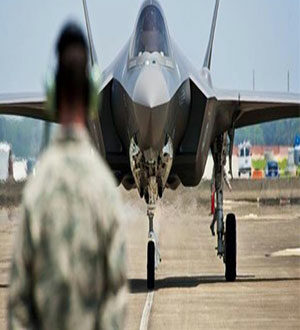The United States has reportedly increased its military aid package to Israel, which would include another squadron of F-35 fighter jets, in an attempt to comfort the crying regime in Tel Aviv over the historic conclusion of nuclear talks between Iran and the P5+1 countries.
The package increase would include extra funding for the development of missile defense system, as well as another squadron of America’s fifth-generation aircraft, F-35 fighter jets, according to a report published by the Jerusalem Post on Thursday.
Restocking munitions that Israel used in last year’s 50-day war on the besieged Gaza Strip would also be included in the package, the report said.
Under the current agreement between Israel and the US, which went into effect in 2009, Tel Aviv receives $3 billion a year, most of which is used to buy American military hardware, such as jets and components for missile defense.
Israel, however, requested between $4.2 billion and $4.5 billion a year for the next 10 years, the New York Times reported on Thursday. The new agreement would last for a decade after going into effect in 2018.
Long before the P5+1 counties began to shape an agreement with Iran, the US was engaged in talks with Israel to increase its military aid, officials familiar with the talks told the Times.
Iran and the P5+1 – the United States, Britain, France, China, Russia and Germany – reached a conclusion on the Joint Comprehensive Plan of Action (JCPOA) in Vienna on Tuesday.
According to the text of the JCPOA, Iran will be recognized by the United Nations as a nuclear power and will continue its uranium enrichment program.
US Defense Secretary Ashton Carter is expected to present the offer to his Israeli counterpart Moshe Ya’alon during a visit to Tel Aviv next week, according to Israeli sources.
Citing administration officials, the Times said President Barack Obama called Prime Minister Benjamin Netanyahu on Tuesday to privately discuss the nuclear agreement with Iran, and offered him the “consolation prize.”
Obama said he was prepared to hold “intensive discussions” with Netanyahu on what more could be done to boost Israel’s military.
Netanyahu, who has called the nuclear conclusion a “historic mistake,” however, refused to engage in the talks “at this juncture,” the officials said.
In an interview with the Times on Tuesday, Obama said Netanyahu “perhaps thinks he can further influence the congressional debate, and I’m confident we’re going to be able to uphold this deal and implement it without Congress preventing that.”
Netanyahu addressed US Congress on March 3 about Iran talks without consulting the White House.
On Wednesday, the 159-page JCPOA document was presented to the Republican-controlled Congress, which now has up to 60 days to review the text and vote to either approve or disapprove of it.
A day earlier, President Barack Obama said that he would veto any legislation from lawmakers that “prevents the successful implementation of the deal.”
 Mouood Mouood English Edition
Mouood Mouood English Edition




